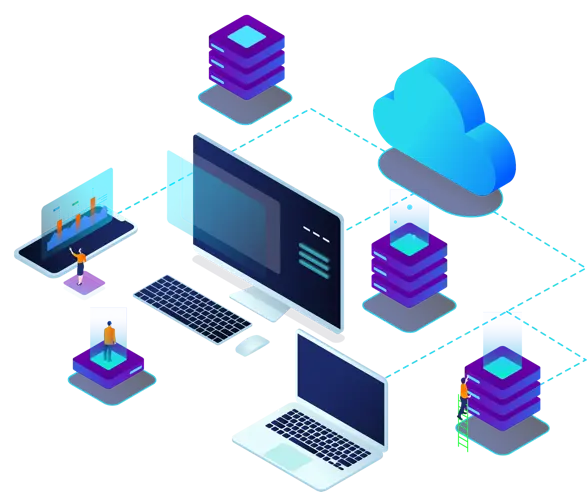Trusted by:

What Is Data Backup & Recovery?
A data backup is a duplicated copy of your data, which is stored in a secure place, often externally so that no single cyber attack or data loss can lose both copies (the original and the copy).
Recovery is restoring the backed-up data to your operations to put it back into use. This is done when data loss has occurred, meaning that the lost data is recovered again.
Is It Really Needed To Backup Your Data?
Data backups are crucial for your business resilience and are the only way to protect your business against losing important data. There are a wide variety of reasons that your business could suffer from data loss, from user error to cyber attacks, but having secure data backups is the only effective way to protect your data from all threats.
*Note – While data backup security will protect your organisation from losing access to valuable data, it won’t protect your data from being stolen. Because of this, you should consider getting a full cyber security package to cover all areas.
About Our Data Backup & Recovery
Data backup & recovery should always follow the industry's standards to ensure nothing can go amiss. These are key features of any data backup security plan, allowing your business to thrive without stress. Here are our keys to data backup & recovery success.
Automatic Scheduling
Data backups can be scheduled depending on your organisation. If you’re a fast-moving business that needs up to data backups, 24-hour backups might be necessary to ensure you don’t lose everything. If you don’t need 24-hour backups, we can set them to run as often as you need.
Data Backup & Recovery Testing
A data backup & recovery system is no good if it fails once you need it. It’s important that both the backup and recovery systems are continuously tested to ensure that no faults or failures occur when it’s put to use. We can test your backup and recovery system as often as you require.
Data Encryption
Data backups must be encrypted to ensure the safety of your sensitive data. In the same way that your internal systems and data should be encrypted, your backups should be too. Otherwise, your data can be accessed without needing access to your systems. We encrypt all of our backups with 256 – AES Encryption.
Offsite Storage
The best way to protect from data loss is to backup your data in multiple external locations. This means that if you get extremely unlucky and both your internal systems and your backup experience data loss simultaneously, you’ll have a third or fourth copy to restore from. We offer offsite storage options to ensure that all of your data is safe from harm.
Scalability
As your business grows, so does the data you need to store. Using a flexible data backup system with enough room for growth will enable your business to scale without causing issues with your backups. We use cloud based backups to ensure that you only pay what you use. It also means that when your company grows and needs more storage, we can facilitate this.
What Are The 3 Types of Data Backup?
There are three main strategies used to back up data. These are:
- Full Backup – This takes a full copy of all data on every scheduled backup.
- Incremental Backup – This only copies files that have changed since the last incremental backup.
- Differential Backup – Takes a copy of all files that have changed since the last full backup.
Full backups are the most expensive option and result in a faster recovery time since you’re only restoring from one file. However, it demands the most storage space and takes much longer to backup files. It’s also less secure since all of the backup files are stored in one version.
Incremental backups are a more cost-effective option due to their need for less storage space. They can also be run as often as needed since only the changes will be copied. However, they are time-consuming to recover since data must be pulled from multiple files.
Differential backups are in-between, with less storage space than full backups but faster recovery than incremental backups.

Why Choose Us?
At Obsidian Networks, we’ve been providing high-quality cybersecurity services since 2004. We conduct over 500 data backups per day in the UK, resulting in over 1000 test recoveries each month.
We work with a variety of sectors, including schools, solicitors & law firms, retailers, and charities. No matter what industry you’re in, we can make sure you never lose access to your data.
To find out more about why you should choose us for your data backup security, visit our About Us page.
What Do Our Clients Think?
Data Backup Security With Obsidian Networks
If you’re looking for data backup services as a standalone service or as part of a full cybersecurity package, we can help. Our solutions are tailored to your business needs, so we’ll never make you pay for something that you don’t want.
Our Cyber Essentials certified team offers anything from Penetration Testing to Cyber Security Monitoring. For more information on our services, visit our Cyber Security Services page.
Book a free IT consultation using the Calendly form below, or get in touch with us to get started.
Data Backup Security FAQs
What Are The Most Common Forms of Data Loss?

Human Error
According to data from the ICO, over 1/3rd of all incidents of data loss are as a result of user error, this makes it the most common form of data loss. This can include mistakes like:
- Alteration of personal data
- Emailing, posting, or faxing personal information to the wrong person
- Incorrect disposal of data
- Failure to use Bcc
- Failure to redact
Power/Hardware Failure
Hardware failure can come through power cuts, old/outdated hardware, or simple mistakes. These can result in the loss of properly backed-up data if the machine that failed is the only copy.
Natural Disasters
While rare, natural disasters can also be a form of data loss. If the data storage is damaged by the event, you’re unlikely to be able to recover it. Because of the nature of a natural disaster, it’s also likely that it would damage any backups that are held on-site or nearby. This is why it’s so important to hold a backup of your data off-site.
Ransomware or Malware
Ransomware and malware account for 13.6% of all data loss incidents, making them a big threat to businesses and organisations. This is why cyber security services are such an important factor for the vast majority of businesses.
Phishing
Phishing is a very common cause of data loss, accounting for 12.3% of all data loss incidents in the UK. Because there are many different forms of phishing, this could cover a variety of cyber attack techniques.
Find out more in our guide: What Is the Difference Between Phishing and Blagging?







